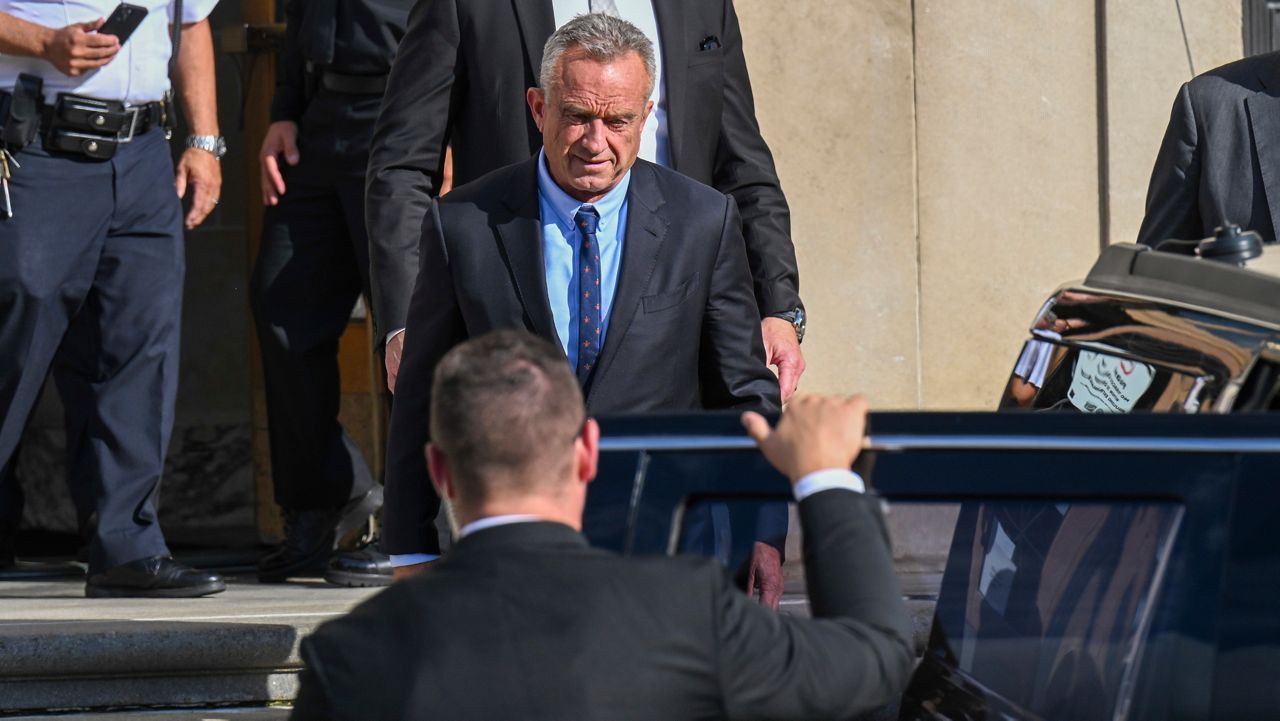Robert F. Kennedy Jr.’s Presidential Campaign Faces Legal Obstacles Over Address Discrepancies in Two States!
Challengers aiming to disqualify Robert F. Kennedy Jr. from appearing on Georgia’s November ballot argued in court on Monday that the independent presidential candidate should be barred because the New York address he used on petitions for ballot access is a “sham.”
This challenge follows a recent ruling by a New York court, which found that Kennedy does not reside at the New York City suburb address he listed. Although the court ruled Kennedy should not appear on New York ballots, Kennedy is appealing this decision.
In New York, a trial began on Monday in suburban Long Island concerning another lawsuit that questions Kennedy’s eligibility to be on the state’s presidential ballot. The legal battle continues as Kennedy’s team works to overturn the ruling.
In Georgia, challengers argue that Kennedy’s use of the New York address makes his petitions invalid. Lawyer Adam Sparks contended that Kennedy’s New York residence was used solely for political purposes and was not genuine. Sparks claimed that the evidence showed Kennedy’s petitions should be voided because they were based on false information.
Kennedy’s lawyer, Larry Otter, presented voting history as proof of Kennedy’s residency in New York. Otter argued that the challengers were attempting to impose qualifications on Kennedy that went beyond the U.S. Constitution’s requirements for presidential candidates, which include being at least 35 years old, a U.S. citizen by birth, and a resident of the country for at least 14 years.
Sparks also questioned Kennedy’s status as an independent candidate. He argued that since Kennedy was running under multiple party nominations in other states, including his own “We the People Party,” he should not be considered an independent under Georgia law. Otter countered that the other parties do not have a presence in Georgia.
In addition to Kennedy, Democrats are challenging ballot access for other independent candidates, including Cornel West, Jill Stein of the Green Party, and Claudia De la Cruz of the Party for Socialism and Liberation.
While these candidates are unlikely to win Georgia’s 16 electoral votes, their presence on the ballot could influence the state’s outcome. In the 2020 election, Biden won Georgia with a narrow margin of fewer than 12,000 votes.
Georgia officials have determined that Kennedy, West, and De la Cruz each collected the required 7,500 signatures to qualify for the ballot. Stein hopes to use a new Georgia law that provides ballot access to candidates from parties qualifying in at least 20 other states.

Administrative Law Judge Michael Malihi heard challenges to Kennedy and De la Cruz on Monday and will hear additional challenges to West and the Green Party on Thursday.
Malihi’s findings will be sent to Georgia Secretary of State Brad Raffensperger, who will make the final decision. A ruling must be made before Georgia begins mailing military and overseas ballots on September 17.
Democrats argue that each of De la Cruz’s and Kennedy’s electors needed to file separate nomination petitions. The candidates’ lawyers dispute this interpretation, suggesting it is incorrect to assume that each campaign needs 120,000 signatures.
Lawyers for the Democrats also claimed that the petitions had illegal formatting errors. They argued that Raffensperger’s office’s acceptance does not guarantee their legal validity. De la Cruz’s lawyer believes the judge should follow the agency’s interpretation.
Estevan Hernandez, a Georgia volunteer for De la Cruz, criticized the Democrats for using technical arguments to challenge other candidates. Hernandez described this as an “undemocratic maneuver” aimed at undermining the intent of the 15,000-plus signatures supporting De la Cruz.
Georgia is one of several states where Democrats and their allies have challenged Kennedy’s petitions. Kennedy’s campaign asserts that it has gathered enough signatures for ballot access in all 50 states.
In New York, plaintiffs supported by the Democratic National Committee argue that most of the more than 145,000 voter signatures collected by Kennedy’s campaign are invalid. They claim some signatures are missing addresses, are illegible, or are from non-registered voters. They also allege that Kennedy’s campaign representatives concealed his name while collecting signatures.
Kennedy is expected to testify in the New York trial, possibly extending into Thursday. His vice presidential running mate, Nicole Shanahan, will testify remotely.
In Pennsylvania, challengers argue that Kennedy’s use of a false address for nominating papers violates state law. Kennedy’s attorney dismisses these allegations as unfounded. A court hearing is scheduled for Tuesday.
Clear Choice Action, a Democrat-aligned political action committee, supports the challenges to Kennedy and West in Georgia and has backed similar lawsuits in New York and other states.
Robert Wittenstein, a suburban Atlanta resident who filed two of the challenges against Kennedy and West, emphasized the importance of playing by the rules.

